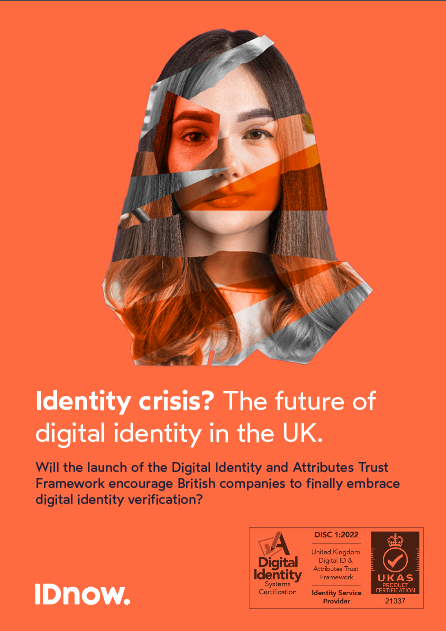Companies are transforming the way their customers access and reuse their services. Is it time you explored reusable identities?
Managing customer accounts and customers’ online identities has become a major challenge for businesses and customers alike.
While there have been significant strides over the last decade regarding remote identity verification, with a variety of automated and expert-led identity verification solutions now available, most options still require repeat verification. For example, each time a customer wishes to open an account or register for a highly regulated service, they need to complete an identification process, which is far from ideal from a business or customer experience standpoint.
However, with digital identity solutions like IDnow’s YRIS, customers can verify and reuse their identity instantly and effortlessly across a multitude of industries and regulated services.
Plus, with YRIS’s recent Substantial Level of Assurance (LoA) certification, it is now recognized as providing a level of identity assurance equivalent to face-to-face verification.
It is highly likely that digital identity will rapidly become the norm for accessing a multitude of online services, for citizens and businesses alike.
Marie Duval, Product Manager for YRIS at IDnow.
Government green light. Which countries have digital identities?
There are currently 2.5 billion people around the world with digital identities, but that figure is expected to reach 4 billion by 2026. India lays claim to the world’s largest biometric ID system. Aadhaar is used by 99% of Indian adults (1.3 billion people) for tasks like opening bank accounts and obtaining SIM cards.
In Europe, one of the first nations to fully embrace digital identity verification was Estonia. In fact, E-ID and its digital signature service was launched over 20 years ago, in 2002. Use cases include e-prescriptions, and i-voting, which is used by approximately 33% of Estonians, wherever they are, to cast votes.
The success of a nation’s digital identity strategy comes largely down to how strongly the private and public sector pushes for its adoption. For example, in France, digital identity is driven by a combination of ambitious public initiatives and innovative private solutions like YRIS.
Identity crisis? The future of digital identity in the UK.

The UK’s digital identity approach has been more hesitant and nuanced. In 2022, it released its Digital Identity and Attributes Trust Framework – a set of rules and standards designed to establish trust in digital identity products.
There are hundreds of use cases across the public and private sectors where digital identities could be used to optimize the user experience. For example, account opening in Banking, compliance checks in Crypto, age verification in Mobility, streamlined check-in processes in Travel, financial risk checks in Gambling, and contract signing in Telecommunication. The UK government has decided to start off with just a few use cases: Right to Work, Right to Rent, and DBS Checks.
As these solutions improve and their adoption grows, it is highly likely that digital identity will soon become the standard for accessing a multitude of online services, both in the public and the private sector.
The world of economic, societal and political possibilities opened by digital identities is vast and varied. According to research from the McKinsey Global Institute, countries that implement digital identities could unlock between 3-13% of GDP by 2030. Broad adoption of an interoperable digital ID system will increase inclusion, and provide greater access to finance, health and other essential services.
Check out below for the top five benefits of digital identity usage for businesses and users.
1. Enhanced security and protection against identity theft.
One of the main advantages of digital identity lies in the enhanced security it provides. With advanced methods like multi-factor authentication and the use of biometrics, the risks of fraud and identity theft are significantly reduced. These technologies ensure that the user is who they claim to be, thus limiting the chances of identity theft.
In addition, digital identity helps to better protect users’ sensitive personal data. By centralizing the management of this data and relying on strict security standards, companies can ensure better protection of personal information, which is crucial in a world increasingly exposed to cyber threats.
2. Improved operational efficiency.
Along with strengthening security, digital identity also improves operational efficiency within organizations by automating processes and reducing processing times, such as during new client onboarding.
By using centralized platforms for identity management, businesses can reduce costs associated with manual management. These gains in efficiency improve productivity and tracking and reduce human errors.
3. Optimized user experience.
One of the most appealing aspects of digital identity is the improved user experience. With solutions such as Single Sign-On, users can access various services without having to juggle multiple usernames and passwords. This simplifies their access to platforms while minimizing friction during online transactions.
Digital identity also allows for greater personalization of services and interactivity. By better understanding the user, businesses can offer tailored services that meet their specific needs. This enhances customer loyalty while providing a seamless and intuitive experience, resulting in overall higher conversion rates.
4. Adhere to regulatory compliance.
Certifications such as the LoA guarantee an equivalent to face-to-face identity verification, while compliance with the eIDAS regulation (electronic IDentification, Authentication and trust Services) and certification by ANSSI (French Cybersecurity Agency) ensure digital identity solutions follow the highest European standards in terms of security and personal data protection.
Businesses that comply with rules, regulations and laws reassure their clients that they’re taking the confidentiality of their personal information seriously. Compliance with European regulations is a strong testament to the rapid adoption of digital identity in sectors such as finance, healthcare and public administration.
5. Undeniable competitive advantage.
Digital identity offers a significant competitive advantage. By using a solution like YRIS, it allows access to new technologies and innovative solutions, while providing the flexibility needed to quickly adapt to market changes.
By offering a smooth and secure user experience, businesses can more easily retain customers, who are more likely to return to services where they feel confident, where their identity is protected and where the experience is simple and intuitive.
YRIS: Transforming the digital future of France.
Digital identity, powered by solutions like YRIS, is profoundly transforming the management of online identity in France and beyond. With enhanced security, compliance with European regulations and advanced fraud protection, YRIS stands out as a simple and trusted solution. Available 24/7, it optimizes operational efficiency through automated processes, unlimited reuse of identity and a simplified user experience.
By easily integrating with existing systems and addressing an inclusive customer base, YRIS offers a comprehensive response to modern digital identity management challenges.
Discover more about the benefits of digital identities in our blog, ‘Why the UK is banking on digital identity in 2023’.
By

Mallaury Marie
Content Manager at IDnow
Connect with Mallaury on LinkedIn



